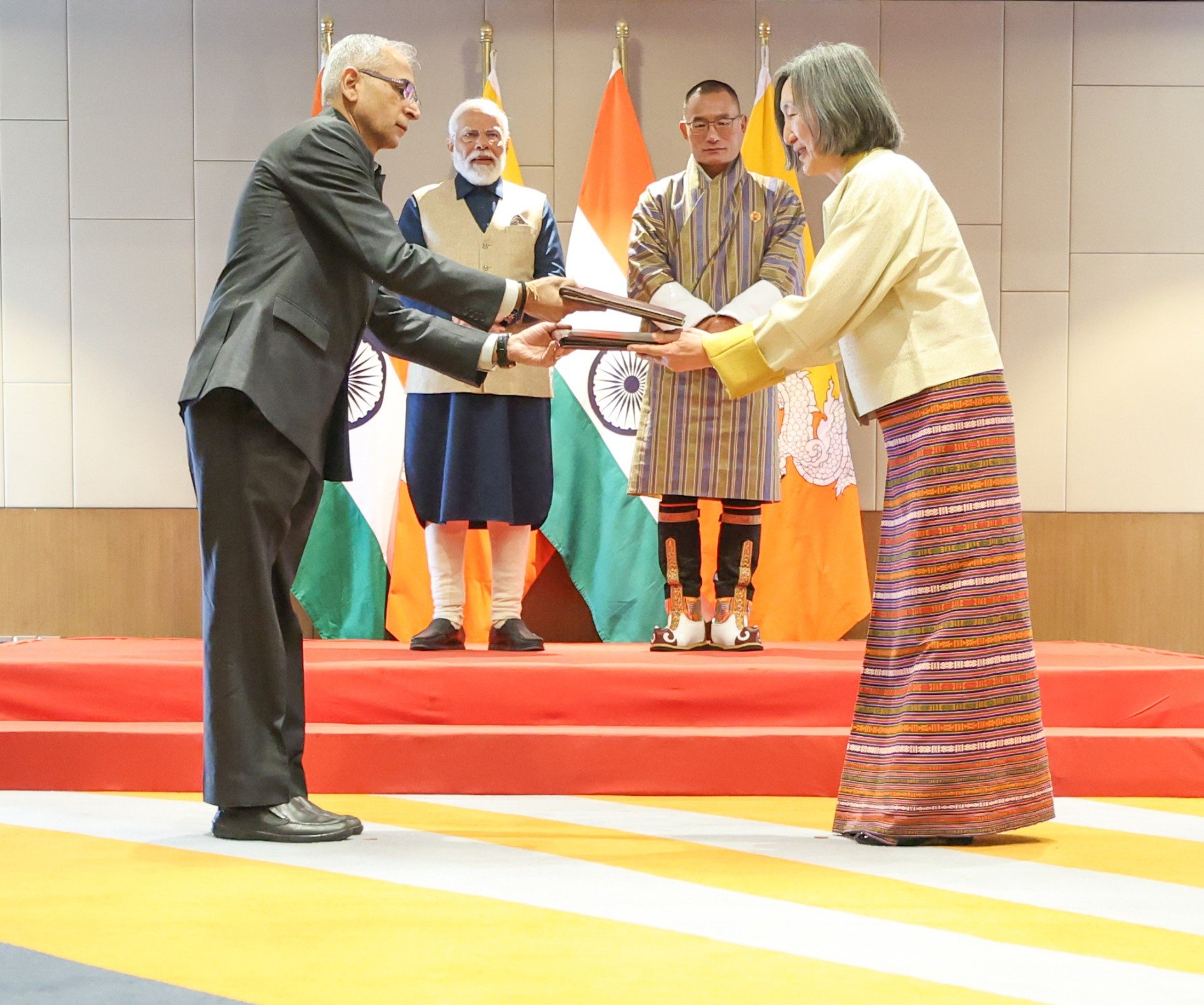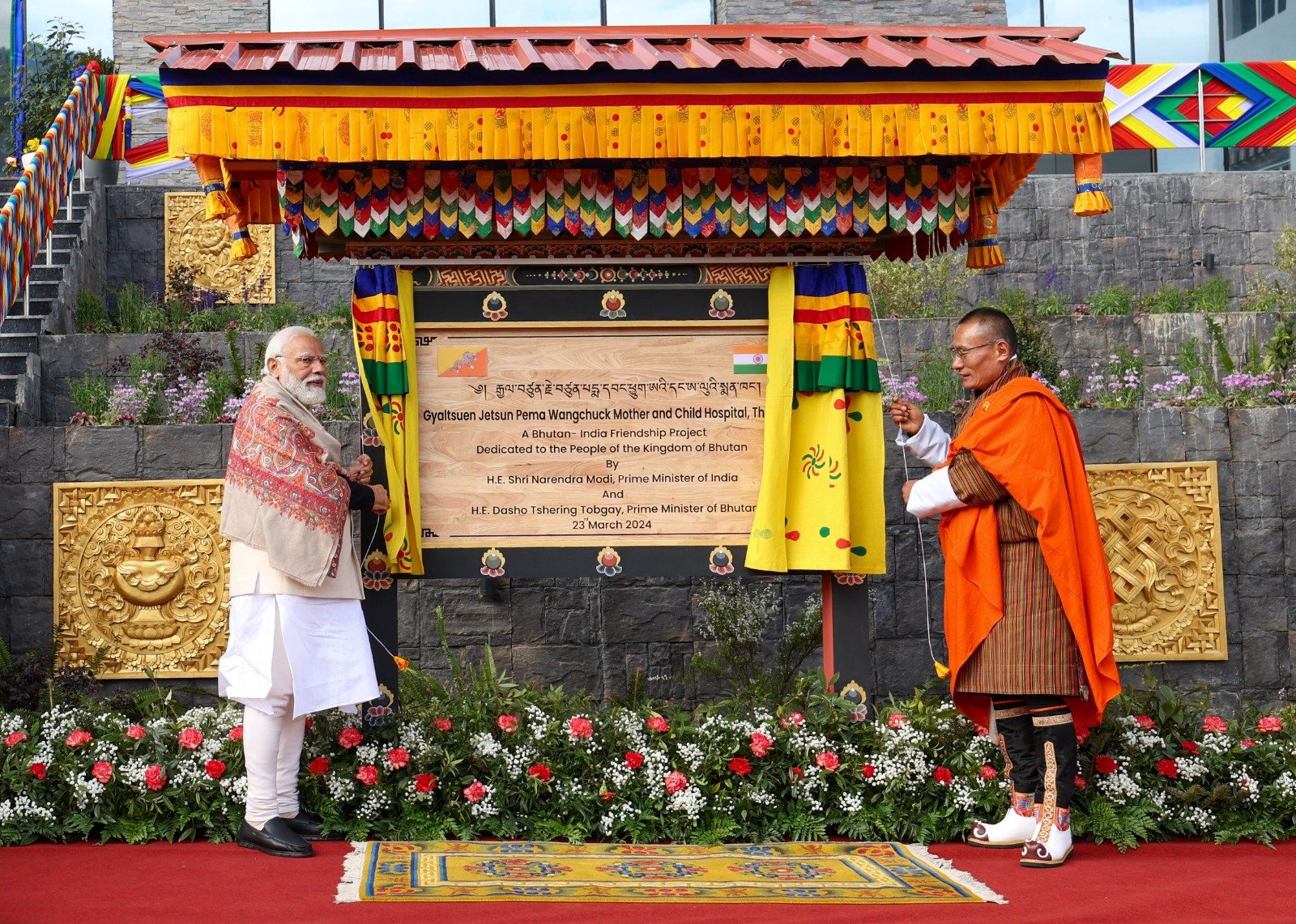Amidst the intricate geopolitical chessboard, a symphony of diplomacy and strategic manoeuvring unfolds between India and Bhutan. Prime Minister Narendra Modi’s recent visit to the Himalayan kingdom has marked a significant chapter in the nations’ longstanding alliance, resonating with camaraderie and trust. As Bhutan navigates its border negotiations with China, India’s steadfast support echoes through the diplomatic engagements and economic partnerships forged during this pivotal visit.
Diplomatic Harmonies
Modi’s visit witnessed a harmonious convergence of shared interests and mutual respect. Meaningful discussions were held with Bhutanese leaders, including Prime Minister Tshering Tobgay and King Jigme Namgyel Wangchuck. These dialogues reinforced the deep-rooted friendship and strategic partnership that underpins the India-Bhutan relationship.
Binding Accords
The visit culminated in the signing of seven Memorandums of Understanding (MoUs), encompassing key areas such as energy, trade, digital connectivity, space, and agriculture. These accords promise to strengthen the multifaceted cooperation between the two nations further. Moreover, India and Bhutan initiated a pivotal agreement to establish rail links, enhancing connectivity and economic integration.
Unwavering Support
Modi expressed strong support for Bhutan’s national initiatives, including Brand Bhutan, Bhutan Believe, and the innovative Gelephu Mindfulness City project. This gesture symbolises India’s commitment to Bhutan’s development and its unwavering solidarity with the kingdom’s aspirations.
Highest Civilian Honour
In a historic move, King Jigme Namgyel Wangchuck conferred the Order of the Druk Gyalpo, Bhutan’s highest civilian honour, upon Prime Minister Modi. This unprecedented accolade highlights the profound bond and mutual admiration between the two countries, transcending mere diplomatic formalities.
Territorial Tensions and Strategic Significance
While the visit strengthened bilateral ties, it also shed light on the complex territorial tensions in the region. In 2021, China and Bhutan agreed to fast-track their border discussions, a move that could significantly impact India’s strategic interests. The strategic location of the Siliguri Corridor, also known as the Chicken’s Neck, adds further complexity to the equation. This vital link between India’s northeastern states and the rest of the country lies in proximity to the disputed Doklam region, heightening its strategic importance.
China’s Territorial Claims
According to China, the Sakteng Wildlife Sanctuary is located in the China-Bhutan disputed areas, a subject on the agenda of the China-Bhutan boundary talks. China claims that the boundary between the two nations has never been delimited, leading to disputes over the eastern, central, and western sectors of Bhutan.
India’s Stance and Treaty Obligations
The India-Bhutan Friendship Treaty of 2007 places the Indian military as virtually responsible for protecting Bhutan from external threats, such as the Chinese military. While the 1949 treaty initially allowed India to “guide” Bhutan’s foreign policy and defence affairs, the 2007 amendment respected Bhutan’s sovereignty sensitivities.
Economic Cooperation and Development
Despite the territorial tensions, economic cooperation remains a cornerstone of the India-Bhutan relationship. Modi announced the doubling of India’s financial assistance to Bhutan for its 13th Five Year Plan, from ₹5000 crore to ₹10000 crore, signifying India’s unwavering commitment to Bhutan’s development.
Connectivity and Integration
The leaders discussed various measures to improve connectivity, including the development of a new airport, rail links, and waterways. These initiatives are poised to foster closer ties between the two nations and bolster economic growth and regional integration.
Trade, Investment, and Special Economic Zones
Both countries pledged to enhance trade and investment, particularly through the private sector, aligning with the vision to develop the Gelephu Special Administrative Region as a dynamic economic hub. The ambitious Gelephu Mindfulness City project, envisioned as a special economic zone, seeks India’s collaboration. This project aims to create an international airport and establish rail and road links with India, fostering economic opportunities and cultural exchange.
As the geopolitical chessboard continues to evolve, the India-Bhutan partnership stands as a harmonious symphony of trust, cooperation, and strategic alignment. Despite the territorial tensions and China’s watchful eye, the two nations have forged a path of economic and diplomatic collaboration, underpinned by a shared commitment to regional stability and mutual prosperity.






